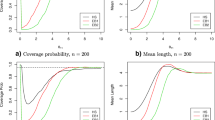Abstract
In Bayesian statistics, the choice of prior distribution is often debatable, especially if prior knowledge is limited or data are scarce. In imprecise probability, sets of priors are used to accurately model and reflect prior knowledge. This has the advantage that prior-data conflict sensitivity can be modelled: Ranges of posterior inferences should be larger when prior and data are in conflict. We propose a new method for generating prior sets which, in addition to prior-data conflict sensitivity, allows to reflect strong prior-data agreement by decreased posterior imprecision.
Access this chapter
Tax calculation will be finalised at checkout
Purchases are for personal use only
Similar content being viewed by others
Notes
- 1.
We denote prior parameter values by upper index \({}^{(0)}\) and posterior parameter values, after n observations, by upper index\({}^{(n)}\).
- 2.
We treat s as a a real-value in [0, n] for convenience of our discussions; this does not affect the conclusions.
References
Augustin, T., Coolen, F., de Cooman, G., Troffaes, M.: Introduction to Imprecise Probabilities. Wiley, Chichester (2014)
Berger, J., et al.: An overview of robust Bayesian analysis. TEST 3, 5–124 (1994)
Bickis, M.: The geometry of imprecise inference. In: Augustin, T., Doria, S., Miranda, E., Quaeghebeur, E. (eds.) ISIPTA 2015: Proceedings of the Ninth International Symposium on Imprecise Probability: Theories and Applications, pp. 47–56. SIPTA (2015). http://www.sipta.org/isipta15/data/paper/31.pdf
Evans, M., Moshonov, H.: Checking for prior-data conflict. Bayesian Analysis 1, 893–914 (2006). http://projecteuclid.org/euclid.ba/1340370946
Quaeghebeur, E., de Cooman, G.: Imprecise probability models for inference in exponential families. In: Cozman, F., Nau, R., Seidenfeld, T. (eds.) ISIPTA 2005, Proceedings of the Fourth International Symposium on Imprecise Probabilities and Their Applications, pp. 287–296. SIPTA, Manno (2005)
Robert, C.P.: The Bayesian Choice: From Decision-Theoretic Foundations to Computational Implementation. Springer, New York (2007)
Troffaes, M., Walter, G., Kelly, D.: A robust Bayesian approach to modelling epistemic uncertainty in common-cause failure models. Reliab. Eng. Syst. Saf. 125, 13–21 (2014)
Walley, P.: Statistical Reasoning with Imprecise Probabilities. Chapman and Hall, London (1991)
Walley, P.: Inferences from multinomial data: Learning about a bag of marbles. J. R. Stat. Soc. Ser. B 58(1), 3–34 (1996)
Walter, G.: Generalized Bayesian inference under prior-data conflict. Ph.D. thesis, Ludwig-Maximilians-Universität München (2013). http://nbn-resolving.de/urn:nbn:de:bvb:19-170598
Walter, G., Augustin, T.: Imprecision and prior-data conflict in generalized Bayesian inference. J. Stat. Theory Pract. 3, 255–271 (2009)
Walter, G., Graham, A., Coolen, F.P.A.: Robust Bayesian estimation of system reliability for scarce and surprising data. In: Podofillini, L., Sudret, B., Stojadinović, B., Zio, E., Kröger, W. (eds.) Safety and Reliability of Complex Engineered Systems: ESREL 2015, pp. 1991–1998. CRC Press, Boca Raton (2015)
Acknowledgements
Gero Walter was supported by the Dinalog project “Coordinated Advanced Maintenance and Logistics Planning for the Process Industries” (CAMPI).
Author information
Authors and Affiliations
Corresponding author
Editor information
Editors and Affiliations
Rights and permissions
Copyright information
© 2016 Springer International Publishing Switzerland
About this paper
Cite this paper
Walter, G., Coolen, F.P.A. (2016). Sets of Priors Reflecting Prior-Data Conflict and Agreement. In: Carvalho, J., Lesot, MJ., Kaymak, U., Vieira, S., Bouchon-Meunier, B., Yager, R. (eds) Information Processing and Management of Uncertainty in Knowledge-Based Systems. IPMU 2016. Communications in Computer and Information Science, vol 610. Springer, Cham. https://doi.org/10.1007/978-3-319-40596-4_14
Download citation
DOI: https://doi.org/10.1007/978-3-319-40596-4_14
Published:
Publisher Name: Springer, Cham
Print ISBN: 978-3-319-40595-7
Online ISBN: 978-3-319-40596-4
eBook Packages: Computer ScienceComputer Science (R0)



